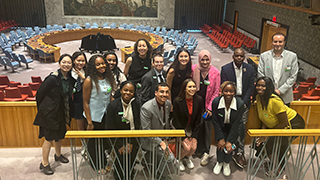Unpacking Misconceptions About NATO’s Role in Afghanistan
Thursday, September 9, 2021

Following President Biden's speech to the nation on Afghanistan on August 26, Moller's analysis helped clarify the geopolitical ramifications of the U.S. military withdrawal.
Speaking with Politifact.com, Moller said that, in Europe, "politicians are having to answer to their own publics about the role their governments played in Afghanistan over the years." She explained that in her view, they are also "trying to head off criticism regarding challenges they are facing getting their own people and local partners out by shifting attention and blaming Washington."
Moller goes on to say that NATO allies were aware of the U.S. plans for withdrawal and removed their own forces ahead of time. "Telling the media now they are shaken by Biden's withdrawal timetable and would have preferred to maintain the status quo — which wasn't a status quo — is hypocrisy at best and a bald face lie, at worst," Moller explains.
In her foreign policy essay for Lawfare, "Five Myths About NATO and Afghanistan," Moller responds to the vocal criticism and charges that have sprung up around America's troop withdrawal from Afghanistan. Drawing on research for her forthcoming book on wartime coalitions, Moller's analysis is based, in part, on conversations with more than four dozen former U.S. and NATO military and political officials, including members of the Joint Chiefs of Staff and national chiefs of defense.
Excerpts from Five Myths appear below.
Myth 1: NATO was in Afghanistan because the alliance invoked its Article V collective
defense (i.e., an "attack against one is an attack against all") clause after 9/11.
It is true that NATO invoked Article V—which stipulates that an armed attack against
one or more members "shall be considered an attack against them all" and entreats
allies to take "such actions" as they deem necessary—in the aftermath of al-Qaeda's
attacks on the United States on Sept. 11, 2001. But neither of the two missions the
transatlantic alliance undertook in Afghanistan—the International Security Assistance
Force (ISAF) and Resolute Support—were Article V missions. Those now claiming that,
by leaving Afghanistan, the United States is not only abandoning Afghans but also
jeopardizing European allies' confidence in U.S. security guarantees are either unaware
of—or worse, deliberately rewriting—history.
Myth 2: NATO's involvement in Afghanistan was a "nation-building" mission.
The suggestion that NATO, like the United States itself, was engaged in a multi-decade
nation-building exercise in Afghanistan ignores the complicated reality of the international
community's 20-year involvement there. Since there is no internationally agreed upon
legal definition of nation-building, evidence for what constitutes nation-building
is often in the eye of the beholder.
Myth 3: The United States blindsided its NATO allies with its "hasty" withdrawal.
Several commentators as well as former British Prime Minister Tony Blair have accused
the U.S. government of leaving "European countries in the lurch" as it went about
the late-summer withdrawal. Some European politicians have even gone so far as to
claim that they were opposed all along to the U.S. withdrawal timetable and spoke
out against it during meetings with U.S. government officials earlier this year. But
neither claim passes muster.
Myth 4: NATO allies could have stayed in Afghanistan after the United States left.
During a heated session of the U.K. Parliament in August, former Prime Minister Theresa
May suggested that Boris Johnson together with other European NATO allies should have
tried to stay in Afghanistan without the United States. In recent days, there have
also been media reports that a handful of European NATO allies were interested in
extending the NATO mission there and tried to establish some kind of mini "coalition
of the willing" to replace the U.S. military presence.
Such pie-in-the-sky thinking is unlikely to have gotten very far—and certainly nowhere near the planning stage—in any European capital owing to the lack of European governments' political will and their militaries' lack of enablers (air power, intelligence, and other kinds of support) needed to sustain such a mission.
Myth 5: NATO allies' perception of U.S. credibility has been shaken.
By far the biggest myth surrounding NATO and Afghanistan that has emerged in recent
weeks is the claim—usually attributed to unnamed "European officials," former leaders
or minor parliamentarians—that European leaders have lost confidence in U.S. security
guarantees because of the Biden administration's withdrawal from Afghanistan.
One of the oddest comments on this score came from George Robertson, who was NATO secretary general on 9/11, and who recently told the Financial Times that the Afghanistan drawdown served as a cautionary tale for NATO about the "time-limited" nature of U.S. security guarantees. "If this is a wake-up call to the Europeans—that in the future they'll have to safeguard their own security much more than before," he said. One would think that a former secretary general of the transatlantic alliance would know the difference between a collective defense guarantee enshrined in a 72-year-old treaty and an ad hoc and improvised commitment to a non-treaty ally.
If anything, America's treaty allies should take comfort from the fact that Washington is finally shedding a costly military misadventure and choosing instead to focus on addressing contemporary challenges facing the alliance, like Russia and China.
Along with several other experts from the School of Diplomacy, Moller will be appearing in an "Ask the Experts" panel on Friday, September 10 from 3:30 p.m.-5:00 p.m. to discuss the latest developments in Afghanistan. Registration details can be found on the calendar.
Categories: Nation and World






